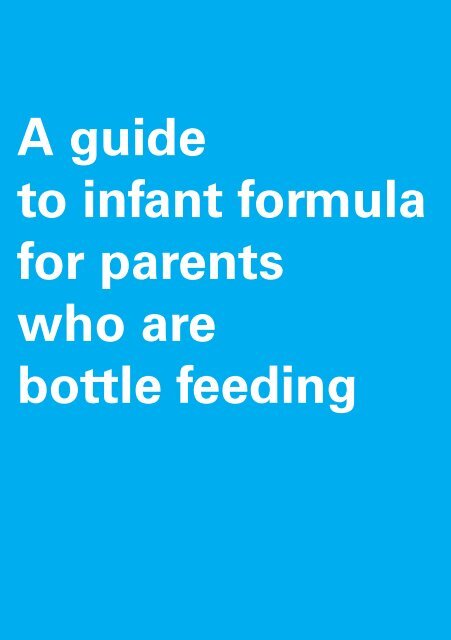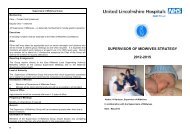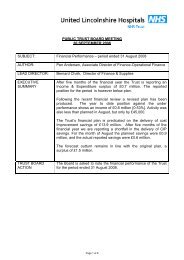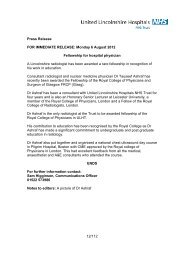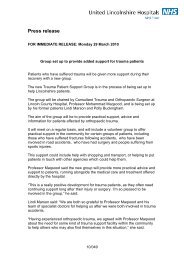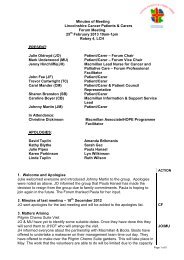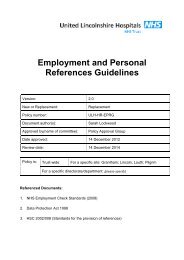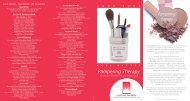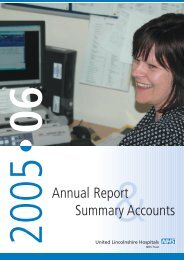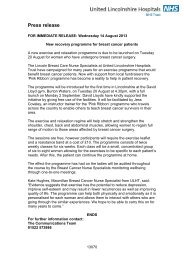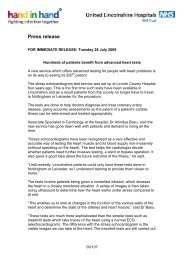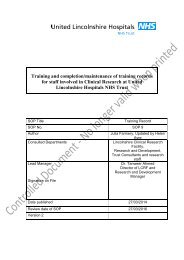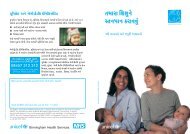A guide to infant formula for parents who are bottle feeding
A guide to infant formula for parents who are bottle feeding
A guide to infant formula for parents who are bottle feeding
Create successful ePaper yourself
Turn your PDF publications into a flip-book with our unique Google optimized e-Paper software.
A <strong>guide</strong><br />
<strong>to</strong> <strong>infant</strong> <strong><strong>for</strong>mula</strong><br />
<strong>for</strong> <strong>p<strong>are</strong>nts</strong><br />
<strong>who</strong> <strong>are</strong><br />
<strong>bottle</strong> <strong>feeding</strong>
Introduction<br />
This booklet is designed <strong>to</strong> help <strong>p<strong>are</strong>nts</strong> <strong>who</strong> <strong>are</strong> not<br />
breast<strong>feeding</strong> decide which <strong>infant</strong> <strong><strong>for</strong>mula</strong> <strong>to</strong> use <strong>to</strong> feed<br />
their baby.<br />
There is a separate Bottle <strong>feeding</strong> leaflet by the Department<br />
of Health on how <strong>to</strong> sterilise equipment and make up a feed.<br />
If you don’t have it, ask your midwife <strong>for</strong> a copy.<br />
If you <strong>are</strong> <strong>bottle</strong> <strong>feeding</strong> you should be shown how <strong>to</strong><br />
sterilise equipment, make up and give a feed be<strong>for</strong>e you<br />
leave hospital. If you haven’t been shown – ask. Even if you<br />
think you know, check with a midwife or health visi<strong>to</strong>r as<br />
some advice may have changed.<br />
What is <strong>infant</strong> <strong><strong>for</strong>mula</strong>?<br />
Most <strong>infant</strong> <strong><strong>for</strong>mula</strong>s <strong>are</strong> made from cow’s milk which has<br />
been processed <strong>to</strong> make it suitable <strong>for</strong> babies.<br />
There <strong>are</strong> several brands of <strong>infant</strong> <strong><strong>for</strong>mula</strong> with different<br />
company names. There is no evidence that one company’s<br />
milk is better <strong>for</strong> your baby than any other. If you think that<br />
one company’s milk disagrees with your baby, try another<br />
company’s milk and speak <strong>to</strong> your midwife or health visi<strong>to</strong>r.<br />
There <strong>are</strong> also different types of milk e.g. first milk, second<br />
milk, follow-on milk, etc. You need <strong>to</strong> be very c<strong>are</strong>ful about<br />
which type of milk you use as this could affect your baby’s<br />
health. Always read the labels very c<strong>are</strong>fully.<br />
2
What types of <strong>infant</strong> <strong><strong>for</strong>mula</strong> <strong>are</strong> there?<br />
First milks<br />
These milks <strong>are</strong> often described as <strong>for</strong> newborns. They <strong>are</strong><br />
based on the whey of cow’s milk and <strong>are</strong> more easily<br />
digested than the other milks. Unless your doc<strong>to</strong>r or health<br />
visi<strong>to</strong>r suggests otherwise, this is the best type of <strong>infant</strong><br />
<strong><strong>for</strong>mula</strong> <strong>for</strong> your baby.<br />
If <strong>bottle</strong>-<strong>feeding</strong>, first milk is the only food your baby needs<br />
<strong>for</strong> the first six months. After six months continue <strong>to</strong> give<br />
first milk as you start <strong>to</strong> introduce solid food. When your baby<br />
is one year old, ordinary (full-fat) cow’s milk can be given.<br />
Second milks<br />
These <strong>are</strong> often described as <strong>for</strong> ‘hungrier babies’. There is no<br />
evidence that babies settle better or sleep longer if given<br />
these milks. They <strong>are</strong> based on the curd of cow’s milk and<br />
take your baby longer <strong>to</strong> digest than first milks. They <strong>are</strong> not<br />
recommended <strong>for</strong> young babies.<br />
Follow-on milks<br />
Follow-on milks <strong>are</strong> described as suitable <strong>for</strong> babies from six<br />
months of age. It is not necessary <strong>to</strong> move your baby on <strong>to</strong><br />
these milks.<br />
Follow-on milks should never be used <strong>for</strong> babies under<br />
six months old as they <strong>are</strong> not nutritionally suitable.<br />
However, the labels can look very similar <strong>to</strong> first milks so<br />
read them c<strong>are</strong>fully.<br />
3
Goodnight milks<br />
Goodnight milks <strong>are</strong> advertised as suitable <strong>for</strong> babies from<br />
six months <strong>to</strong> three years of age. They contain follow-on milk<br />
and cereal.<br />
These milks should never be given <strong>to</strong> babies under six<br />
months old as they <strong>are</strong> not nutritionally suitable. They <strong>are</strong> not<br />
necessary <strong>for</strong> any baby and there is no independent evidence<br />
<strong>to</strong> support the claim that they help babies settle or that they<br />
<strong>are</strong> easy <strong>to</strong> digest.<br />
Soya <strong><strong>for</strong>mula</strong><br />
Soya <strong><strong>for</strong>mula</strong> is made from soya, not cow’s milk. Soya<br />
<strong><strong>for</strong>mula</strong> contains high levels of a chemical called<br />
phy<strong>to</strong>estrogen which may have negative effects on babies<br />
and so should only be used in exceptional circumstances and<br />
only under the recommendation of a doc<strong>to</strong>r.<br />
Goat’s milk-based <strong>infant</strong> <strong><strong>for</strong>mula</strong><br />
Do not give your baby goat’s milk-based <strong>infant</strong> <strong><strong>for</strong>mula</strong>, as<br />
this is not approved <strong>for</strong> use <strong>for</strong> babies less than one year<br />
under UK regulations.<br />
Ordinary cow’s milk<br />
Do not give your baby ordinary cow’s milk as a drink until he<br />
is one year old, as it is not nutritionally suitable until then.<br />
4
How often should I feed my baby?<br />
You should feed your baby as much as he wants, as often as<br />
he asks, provided he is not regurgitating significant amounts.<br />
If he is regurgitating significant amounts this may mean that<br />
he wants smaller amounts – but more often – than the ‘<strong>guide</strong>’<br />
section on the tin or packet suggests.<br />
Newborn babies may take quite small volumes <strong>to</strong> start with,<br />
but by the end of the first week of life most babies will ask<br />
<strong>for</strong> approximately 150–200ml per kg per day – although this<br />
will vary from baby <strong>to</strong> baby – until they <strong>are</strong> six months old.<br />
Avoid over<strong>feeding</strong>. Giving lots of milk in one feed will not<br />
necessarily enable your baby <strong>to</strong> go longer between feeds. It is<br />
just as likely <strong>to</strong> make him be sick, or put on <strong>to</strong>o much weight.<br />
Don’t try and make him finish the <strong>bottle</strong> if he doesn’t seem <strong>to</strong><br />
want it.<br />
How do I know if my baby is hungry?<br />
You will soon learn <strong>to</strong> recognise signs of hunger in your<br />
baby. If you can spot these be<strong>for</strong>e he is crying <strong>for</strong> food, he<br />
will be easier <strong>to</strong> feed.<br />
• When he wakes up he will start <strong>to</strong> move about. This would<br />
be a good time <strong>to</strong> start preparing the feed.<br />
• He will then begin <strong>to</strong> move his head and mouth around.<br />
• Finally he will find something <strong>to</strong> suck, usually his fingers.<br />
This would be a good time <strong>to</strong> offer your baby some milk.<br />
5
How do I know if my baby is getting enough milk?<br />
Your baby’s weight gain and what is in the nappy will tell you<br />
whether he is getting enough <strong>to</strong> eat.<br />
• Your baby will be producing at least six wet nappies a day<br />
after the first day or so. These should be soaked through<br />
with clear or pale yellow urine.<br />
• For the first few days after birth your baby will pass dark<br />
sticky s<strong>to</strong>ols (meconium). After the first week your baby<br />
should pass pale yellow or yellowish-brown s<strong>to</strong>ols. Bottlefed<br />
babies will need <strong>to</strong> pass s<strong>to</strong>ols at least once a day <strong>to</strong><br />
feel com<strong>for</strong>table.<br />
• Your baby will be weighed at 8,12 and 16 weeks and at 1<br />
year and the results plotted on a chart.The findings will be<br />
discussed with you.<br />
What if my baby seems constipated?<br />
Often this can be resolved with closer attention <strong>to</strong> the way in<br />
which the feed is made up, or possibly by changing brands.<br />
Ask your health visi<strong>to</strong>r <strong>for</strong> advice.<br />
What about <strong>bottle</strong>s and teats?<br />
Teats can be made from rubber or silicone and vary in shape.<br />
There is no evidence that one teat is better than another. It<br />
is fine <strong>to</strong> try different teats and use the one that suits your<br />
baby best.<br />
All <strong>feeding</strong> <strong>bottle</strong>s <strong>are</strong> made of food-grade plastic. However,<br />
some shapes and patterns on <strong>bottle</strong>s can make them difficult<br />
<strong>to</strong> clean. A simple, easy-<strong>to</strong>-clean <strong>bottle</strong> is probably best.<br />
6
How do I help my baby <strong>to</strong> feed from a <strong>bottle</strong>?<br />
• Always hold your baby close <strong>to</strong> you and look in<strong>to</strong> his eyes<br />
when <strong>feeding</strong>. This helps your baby feel safe and loved.<br />
• Try <strong>to</strong> hold your baby fairly upright, with his head supported<br />
in a com<strong>for</strong>table, neutral position.<br />
• Hold the <strong>bottle</strong> horizontal <strong>to</strong> the ground, tilting it just<br />
enough <strong>to</strong> ensure your baby is taking milk, not air, through<br />
the teat. Babies feed in bursts of sucking with short pauses<br />
<strong>to</strong> rest. In this position, when your baby pauses <strong>for</strong> a rest<br />
the milk will s<strong>to</strong>p flowing, allowing him <strong>to</strong> have a short rest<br />
be<strong>for</strong>e starting <strong>to</strong> suck again.<br />
• Brush the teat against his lips and whenheopens his<br />
mouth wide with his <strong>to</strong>ngue down, help him draw the<br />
teat in.<br />
• You will see bubbles in the <strong>bottle</strong> as your baby feeds. If you<br />
can’t see any bubbles, break the suction between his <strong>to</strong>ngue<br />
and the teat from time <strong>to</strong> time by moving the teat slightly <strong>to</strong><br />
the side of his mouth. You should then see bubbles rushing<br />
back up in<strong>to</strong> the remaining milk.<br />
• Your baby may need short breaks during the feed; he may<br />
also need <strong>to</strong> burp sometimes.<br />
• Interrupting the feed from time <strong>to</strong> time also gives your<br />
baby a chance <strong>to</strong> register how ‘full’ he is, and thus control<br />
his intake.<br />
Your baby needs <strong>to</strong> be able <strong>to</strong> relate <strong>to</strong> those caring <strong>for</strong> him.<br />
Aim <strong>to</strong> keep the number of people <strong>who</strong> feed him as small<br />
as possible.<br />
Your baby should always be held and never be left<br />
unattended while <strong>feeding</strong> from a <strong>bottle</strong>.<br />
7
What about winding?<br />
If your baby shows signs of distress during the feed,<br />
encourage him <strong>to</strong> let go of the teat and sit him up, or put him<br />
over your shoulder, and see if he needs <strong>to</strong> burp. Continue<br />
<strong>feeding</strong> him when he seems more com<strong>for</strong>table.<br />
When should I start giving other foods <strong>to</strong> my baby?<br />
The recommended age <strong>for</strong> starting <strong>to</strong> offer your baby other<br />
foods is six months. All the nourishment your baby needs <strong>for</strong><br />
the first six months is provided by first milks.<br />
It is normal <strong>for</strong> your baby’s <strong>feeding</strong> and sleeping patterns <strong>to</strong><br />
alter as he grows and develops. This does not mean that you<br />
need <strong>to</strong> change the type of milk or introduce solid food.<br />
Once you start introducing solid food, carry on offering your<br />
baby first milk as well as other foods until your baby is a year<br />
old. Babies can be encouraged <strong>to</strong> use cups when they start<br />
on solid food at around six months.<br />
For further in<strong>for</strong>mation please see the Department of Health’s<br />
Bottle <strong>feeding</strong> leaflet and the Birth <strong>to</strong> Five book (click titles <strong>to</strong><br />
download them).<br />
Breast<strong>feeding</strong> is the healthiest way <strong>to</strong> feed your baby. If<br />
you decide not <strong>to</strong> breastfeed or <strong>to</strong> s<strong>to</strong>p breast<strong>feeding</strong>, it is<br />
possible <strong>to</strong> restart butitwillbedifficult.Giving <strong>infant</strong> <strong><strong>for</strong>mula</strong><br />
<strong>to</strong> a breastfed baby will reduce your breastmilk supply.<br />
You do not need<strong>to</strong>eat any special foods while breast<strong>feeding</strong>,<br />
but it is a good idea <strong>for</strong> you, just like everyone else,<strong>to</strong>eata<br />
healthy diet. It is recommended that all pregnant and<br />
breast<strong>feeding</strong> women take a daily supplement of 10 mcg of<br />
Vitamin D.<br />
8 UNICEF UK Baby Friendly Initiative, 30a Great Sut<strong>to</strong>n Street, London<br />
EC1V 0DU Tel: 0844 801 2414 Email: bfi@unicef.org.uk


